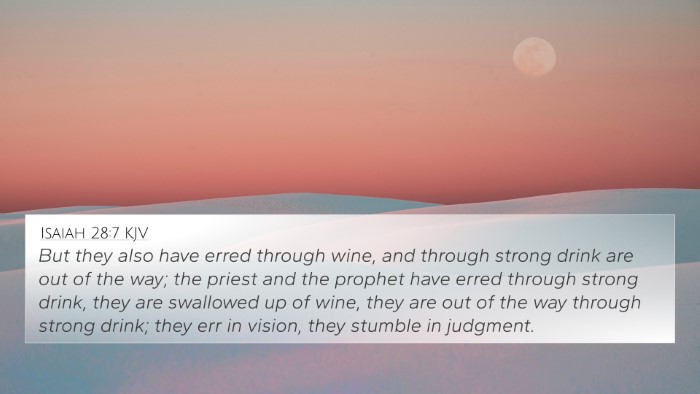Understanding Matthew 23:25
Bible Verse: "Woe to you, scribes and Pharisees, hypocrites! For you clean the outside of the cup and dish, but inside they are full of extortion and self-indulgence."
Summary of Verse Meaning
Matthew 23:25 highlights the hypocrisy of the religious leaders of Jesus' time, the scribes and Pharisees. Despite their outward appearance of piety and dedication to the law, their inner selves are corrupt and filled with greed and indulgence. This contrast between outward behavior and inner reality serves as a moral lesson regarding genuine spirituality and integrity.
Commentary Insights
Matthew Henry's Commentary
Matthew Henry emphasizes the significance of the metaphor of the cup and dish. He explains that the metaphor represents a person’s life; although they may look clean and perfect on the outside, their hearts are filled with sin and selfish desires. This commentary calls attention to the importance of inner purity over mere outward appearance.
Albert Barnes' Commentary
Albert Barnes remarks that Jesus' criticism of the scribes and Pharisees exposes their superficial adherence to the law. He points out that the "cleaning" of the outside is an act of vanity, as it fails to address the more critical moral failures they possess. Barnes interprets this as a critique of those who prioritize appearance over truth and righteousness.
Adam Clarke's Commentary
Adam Clarke contributes that this verse underscores the need for sincere repentance and genuine faith. He illustrates how the Pharisees, while maintaining an air of righteousness, were actually striving to fulfill their own desires rather than serving God. Clarke advocates for an internal examination of one's soul rather than a mere external compliance with religious norms.
Bible Cross References
- Luke 11:39 - "But the Lord said to him, 'Now you Pharisees cleanse the outside of the cup and dish, but your inward part is full of greed and wickedness.'
- 1 Samuel 16:7 - "For the Lord sees not as man sees: man looks on the outward appearance, but the Lord looks on the heart."
- Matthew 15:18-19 - "But what comes out of the mouth proceeds from the heart, and this defiles a person. For out of the heart come evil thoughts... "
- Galatians 5:19-21 - "Now the works of the flesh are evident: sexual immorality, impurity, sensuality..."
- Titus 1:15-16 - "To the pure, all things are pure, but to the defiled and unbelieving, nothing is pure..."
- James 4:8 - "Draw near to God, and he will draw near to you. Cleanse your hands, you sinners, and purify your hearts, you double-minded."
- 2 Corinthians 5:17 - "Therefore, if anyone is in Christ, he is a new creation. The old has passed away; behold, the new has come."
Connecting this Verse to Broader Themes
This verse is pivotal in understanding the theme of inner purity versus outward appearance in Biblical texts. It serves as a warning against hypocrisy, calling readers to evaluate their own lives and spiritual practices.
Thematic Connections
- Hypocrisy: The struggle between appearance and reality is a recurrent theme in the Bible, prominently featured in the teachings of Jesus.
- Heart Transformation: Biblical texts like Galatians and 2 Corinthians affirm that the true essence of faith is internal rather than merely ritualistic.
- Integrity: The moral integrity driven by inner change is central to Jesus' message, highlighting that true worship comes from the heart.
Conclusion
Matthew 23:25 invites readers to explore the importance of genuine faith and the dangers of living a life focused on external appearances. By examining cross-references and connecting themes from the Bible, believers can further understand the call to a deeper, more authentic relationship with God.
Tools for Bible Cross-Referencing
For those seeking to delve deeper into scripture, several tools for Bible cross-referencing can enhance your study:
- Bible concordance – comprehensive indexes of scripture.
- Bible cross-reference guides – tools that help link verses by themes.
- Cross-reference Bible study materials – commentaries and resources that provide detailed connections.
- Inter-Biblical dialogue – exploring connections between Old and New Testament teachings.






